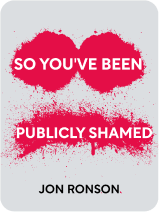

This article is an excerpt from the Shortform book guide to "So You've Been Publicly Shamed" by Jon Ronson. Shortform has the world's best summaries and analyses of books you should be reading.
Like this article? Sign up for a free trial here .
What is Jon Ronson’s book So You’ve Been Publicly Shamed about? Why do people participate in public shamings?
In So You’ve Been Publicly Shamed, Jon Ronson discusses the psychology of public shaming and the use of shame as punishment. While doing research for the book, Ronson discovered that many public shamers have two things in common: 1) they want to contribute to the greater good; and 2) they tend to downplay the psychological consequences of shaming for the victim.
Here’s a brief overview of So You’ve Been Publicly Shamed by Jon Ronson.
Book Overview: So You’ve Been Publicly Shamed by Jon Ronson
Journalist and author Jon Ronson first became interested in the modern resurgence of public shaming after someone used his name and photo to create a Twitter spambot. Ronson was ashamed of what the bot tweeted—it didn’t accurately represent his identity—and started a public shaming campaign to get the bot taken down. It worked.
Intrigued by the process, Ronson researched public shaming, interviewed its victims, and sought out shame-avoidance and recovery strategies.
Below is quick summary of Jon Ronson’s So You’ve Been Publicly Shamed.
Why Do People Shame Others?
While writing the book, Ronson discovered two factors that many public shamers have in common:
Factor #1: The Desire to Do Good
Many people who participate in public shaming think they are doing something good. Public shaming is a way of getting justice in a broken system.
For example, Mercedes Haefer has participated in many shamings and online attacks because the internet is where she has power. When a boy on YouTube posted videos of himself abusing his cat, Haefer and other members of an online community called 4chan tracked him down. They told his entire town that he was a sociopath, which got the cat sent to a new home.
Factor #2: The Belief That Shaming Isn’t a Big Deal
Ronson also discovered plenty of people who were unaware of the effects of shaming. Some people who had participated in online shamings had never thought about how their comments affected the shamee, or if they had, they assumed the shamee would be fine over time. Ronson himself couldn’t even remember all the names of people he’d shamed.
Additionally, some people see shaming as not only harmless but as a popular leisure activity. These days, on Twitter especially, users actively look for misspeaking or poorly chosen jokes to shame people over.
Consequences of Shame: Reform, Breakdown, and Violence
Initially, Jon Ronson thought public shaming was a force for good. Underdogs and average citizens can hold powerful people and corporations accountable and put enough pressure on them that they’re forced to change for the better. However, as Ronson learned more, he discovered that public shaming can also be a destructive force that ruins people’s lives, even if those people haven’t actually done anything wrong.
Reform
Public shaming can be a force for a good—the public can call out previously inaccessible people and companies for objectively despicable behavior. Shaming can force change that would be time-consuming or impossible to win through the justice system. It can also be a successful motivator for reform when used within the justice system.
- Example #1: After the death of gay singer Stephen Gately, Daily Mail columnist Jan Moir wrote that civil partnerships could never have happily-ever-afters. The public was so angry that Nestlé and Marks & Spencer pulled their advertising from the Daily Mail’s website and the paper lost money.
- Example #2: Judge Ted Poe, who’s famous for assigning embarrassing punishments, sentenced Mike Hubacek, who’d killed two people while driving drunk, to a variety of shame-inducing punishments. These included carrying a sign that said he’d killed people driving drunk while walking in front of bars and schools. He had to do this once a month for ten years. While doing all of his punishments, Hubacek found a sense of purpose—he could warn others not to drive drunk. He now speaks at schools and owns a halfway house. He’s very grateful to Poe.
Breakdown and Violence
Public shaming can also destroy people. First, shaming is very painful, and people who are shamed online can lose their reputations, jobs, friends, and family, potentially forever.
- For example, Kevin Tunell, like Hubacek, killed someone while driving drunk. The victim’s parents offered to reduce his $1.5 million fine if he would pay them $936 up front and mail them a $1 check in their daughter’s name once a week for eighteen years. Tunell accepted the offer, but every time he had to write the girl’s name, he was overwrought with guilt and psychologically tortured, and he eventually stopped sending payments because he couldn’t bear to write the check. When her parents took him to court, he broke down.
Second, most violence isn’t motivated by revenge or self-defense—it’s motivated by shame. Violence is an effective way to gain instant self-esteem—threatening someone with a gun tends to make them treat you with respect—and this self-esteem and respect help fill the void caused by shame.
- For example, when psychiatrist James Gilligan studied violent inmates in prisons and mental hospitals in Massachusetts, he discovered that all of them had experienced severe shame at some point in their lives, such as being abused by their parents. Gilligan started deshaming programs such as therapeutic communities and education that boosted the inmates’ self-esteem, and violence decreased.
Finally, even just the threat of public shaming negatively affects people—some people are so scared of being shamed that they worry about being surveilled and tone down their personalities to create a bland online presence. Because public shamings over misunderstandings can be just as brutal as shamings resulting from actual wrongdoing, it’s safest to be mild.
Due to these negative effects, Ronson recommends reflecting before shaming anyone. He no longer shames people unless they’ve victimized someone.
How to Respond to a Public Shaming
So you’ve been publicly shamed—what next? Ronson discovered that there are six approaches to recovering from public shaming.
Approach #1: Withdraw and Wait
Withdrawing includes shutting down social media accounts, refusing to give interviews, avoiding public places, and lying low until things blow over. This is a popular approach, though it doesn’t work particularly well—sometimes the shaming reincarnates when the shamee tries to return, and the shamee has to endure feelings of isolation.
Approach #2: Write a New Narrative
Before a public shaming, the victim has a life story. During the shaming, the public reduces the victim’s identity to revolve entirely around their transgression. Instead of holding on to the original narrative, approach #2 is to create a private third life narrative that explains the reasoning behind the transgression to reduce personal feelings of shame.
Approach #3: Become Emotionally Invulnerable to Shame
Becoming emotionally invulnerable to shame involves refusing to let shame affect you. To learn more about this approach, Ronson spoke to porn stars, who have to learn to manage shame because their industry is associated with it. Ronson interviewed Princess Donna Dolore, who said that if she publicly shared the things that embarrassed her, they were no longer embarrassing. One of her models, Jody Taylor, feels the same—she thinks that fiction, by nature, can’t be frightening or humiliating, so instead, the porn scenarios she performs are “awesome.”
Dolore’s goal is to make people feel less ashamed of what they want, and her work to demystify strange sex is probably part of the reason that fewer men are shamed for sex scandals these days.
Approach #4: Attend a Radical Honesty Workshop
Psychotherapist Brad Blanton believes shame thrives in secret—if you’re constantly worrying about what other people think or you’re worried about being exposed, you feel shame. Therefore, you can get rid of shame by being radically honest and telling everyone exactly what you’re thinking at all times. For example, if you want to sleep with your wife’s sister, you should tell both your wife and her sister this. You can learn how to break news like this, or spill any of your secrets, by attending a Radical Honesty workshop.
To Ronson, the Radical Honesty method seemed to be mainly people yelling at each other, and sometimes this went quite badly. For example, after the workshop Ronson attended, one man tried to be honest with his wife and she tried to physically push him away. He responded by saying that he was going to get an ax and defend himself by killing her. Unsurprisingly, she called the police.
Approach #5: Apply for the Right to Be Forgotten
In 2006, the European Court of Justice ruled that if an online text about someone was “inadequate, irrelevant…or excessive,” people could request that Google deindex the article or blog from its European sites. This means that, in theory, you could ask Google to remove shameful information about you from its search indexes.
While this ruling did result in a lot of material being deindexed—within three months, 70,000 people made requests—it also brought some of the things that people wanted buried back into the spotlight. As Google met requests, it sent automatic notices to media outlets letting them know their articles had been deindexed, which created resistance to the ruling. People started bringing up old stories again so they couldn’t be forgotten.
Approach #6: Hire a Reputation Management Company
Reputation management companies aim to hide shameful or damaging information about people by creating new online content that knocks undesirable content onto the second or third page of online search results. According to Google, 53% of people don’t look past the first two search results and almost 90% of people don’t ever click past the first page.

———End of Preview———
Like what you just read? Read the rest of the world's best book summary and analysis of Jon Ronson's "So You've Been Publicly Shamed" at Shortform .
Here's what you'll find in our full So You've Been Publicly Shamed summary :
- How public shaming can ruin people's lives
- Why public shaming isn't just a way to get corporations to do the "right thing"
- 6 strategies you can use if you're a victim of public shaming






